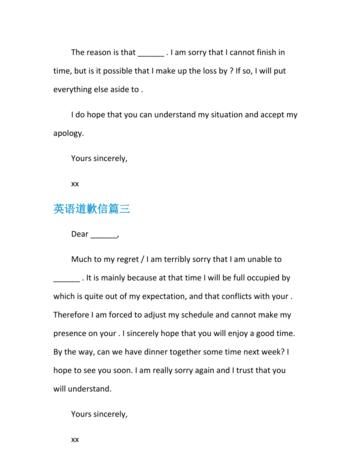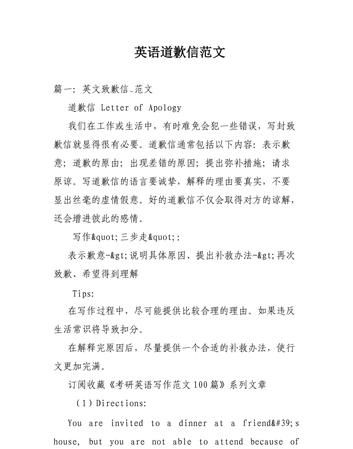本文目录
我感到非常抱歉用英语怎么说
I am so sorry to sb.哦,记住罗。
记得采纳啊

回答抱歉的英文短语
抱歉是指心有愧疚不安,对不住别人。下面是我给大家整理的表示抱歉的英文 短语 ,供大家参阅!
表示抱歉的英文短语篇1
表示抱歉(Apologies):
(1) 简单的表达道歉:
A)Now, sometimes, especially with people you don’t know, it’s more polite to say ‘I’m sorry’. For example, imagine you’re in a library and you step backwards without looking and step on someone’s foot. In this situation, it would be polite to say: (有时候,对于你不认识的人,说“我很抱歉”——‘I’m sorry’要显得更礼貌点。 例如,假设在图书馆,你后退的时候没看见后面有人所以踩到了别人的脚。 在这种情况下,礼貌的道歉应该是):
Ah! I’m sorry! 啊,我很抱歉!
B)Now, if you need to say sorry for doing something wrong to someone you know well or care about a lot, we often add the words ‘really’ or ‘so’ to emphasize how we feel. For example:(如果是做错了事,需要向你熟悉或是非常在乎的一个人道歉,须得在sorry前加上really(非常)或者so(实在是)来强调你的歉意。 例如:)
I’m really sorry, Pete, I didn’t mean to hurt your feelings. (Pete,我真的很抱歉,我不是有意要伤害你的。)
I’m so sorry I forgot your birthday, Oliver! (Oliver,忘记你的生日,我真的很抱歉。) I was well out of order. I've been having a hard time lately but that's no excuse. I'm awfully sorry. 我(那天)特别不对劲! 最近什么都不顺,但是我知道我不可以把这个作为借口。 真的很对不起。
(2) 表示道歉并同时告知对方理由:
1. I am sorry + 一个有主谓宾的完整 句子
例如:
I’m sorry I’m late! 对不起我迟到了!
I’m sorry I forgot my text book. Or I’m sorry I’ve forgotten my text book. 很抱歉,我忘带课本了。
2. (I am) sorry to + 动词原形:
例如:
I am sorry to have given you so much trouble. 很抱歉给你带来那么大麻烦。
Sorry to be a bother/pest. 不好意思打扰你.
Sorry to disturb you again. 抱歉, 又来打扰你.
3. 用上about的句型:Sorry about/ I am sorry about + 名词
例如:
Sorry about the mess. I’ll clean up later! 弄得乱糟糟的,真是不好意思。 我待会儿会收拾的。 Sorry about the inconvenience. 对不起添麻烦了.
I’m sorry about the trouble I’ve caused. 给您造成了麻烦,真是不好意思。
I’m so sorry about last night. 昨晚上真是抱歉!
4. 用上for的句型:
Sorry for/I am (really) sorry for/I want to apologize for/I do beg your pardon for + 动名词/从句,或者:
I want to say sorry to sb. for sth./I would like to apologize to sb. for sth.
例如:
I owe you an apology for what i did last night.我应该为昨天晚上的事向你道歉. I'm sorry for what I've done. 我为我的所作所为向你道歉.
I'm sorry for lying but it seemed the best thing to do at the time! 我很抱歉,我说了谎;但是在当时,那是最好的选择。
I want to apologize for the way I spoke to you the other day. 那天那样跟你说话,我向你道歉!
I do beg your pardon for the mistake I've made.请您一定原谅我所犯的错误。 I would like to apologize to all the ladies and to all their families for any harm or hurt that they have been feeling. I'm sorry... Most importantly, I would like to say sorry to all the people in Hong Kong. I give my apologies sincerely to you all, unreservedly and with my heart. 我向所有的相关的女士和他们的亲属,为他们受到的任何的伤害进行道歉,我很抱歉。最重要的是,我想向所有香港人民道歉,我向你们诚恳的道歉,毫无保留,衷心的向你们道歉。
5. It's (all) my fault./My mistake./It was so stupid of me. /Forgive me, + 一个完整的
句子
例如:
It's my fault. I really feel bad about it. 是我的错. 我真的感到很难过。 It's all my fault. I’ll try to make it up to you.这事儿全怪我. 我会尽力补救。 My mistake. It won't happen again. 是我的错. 不会再发生类似的事情了。 It was so stupid of me. I really do apologize. 非常抱歉, 我当时真糊涂。 Forgive me, I didn't mean to offend you. 请原谅, 我不是有意惹你生气.
6. 其他:
Please excuse my careless words. 请原谅我那些无心的话。
I shouldn't have done that. I should have asked you first. 我不该那么做。我应先征得你的同意。
I honestly didn't mean it. 我的确不是故意的。
I didn't mean to do that. 我并不想要那么做。
I didn't mean it that way. 事情闹成那样并非我的本意。
I don't know how that could have happened. 我不知道怎么会发生那样的事。 You were right and I was wrong. I apologize. 你是对的, 我错了。我道歉。
7. 接受道歉:
I won't hold it against you. 我不会记仇的.
I'll let you off this time. I'll give you another chance. 这回我放过你.我再给你一次机会.
Apologies accepted. 接受你的道歉。
Okay. I accept your apology. 好吧. 我接受你的道歉.
You're forgiven. 我原谅你.
It doesn't matter at all. 一点也没关系。
It's ok. That can happen to the rest of us. 没关系,谁都会发生这种事情。 No problem. We all make mistakes. 没问题. 人人都有犯错的时候.
Never mind about that./That's all right. 没关系。
That's okay. 没事儿.
No harm done. 没什么.
Forget it. 忘掉它吧.
It's not your fault. 那不是你的错.
It really doesn't matter at all. 真的没关系.
Never mind. 无所谓.
Don't worry about it. 别放在心上.
Think no more of it. 别再想它了.
Don't give it another thought. 不要再想了.
8. 不接受道歉
It's easy to say sorry, but who will make up for the loss?
说声对不起很容易,但谁来补偿损失?
To tell you the truth, your apology can't be accepted.
说实话,你的道歉不被接受。
表示抱歉的英文短语篇2
1. 表示道歉的常用交际套语
I must apologize. 我必须道歉。
I must apologize about that. 我的确要为此向你道歉。
I must apologize for what I said. 我必须对我说的话表示歉意。
I beg your pardon. 请你原谅。
I‘m very sorry for that. 我为此非常抱歉。
Please forgive me, I really didn‘t mean that. 请原谅,真的不是那个意思。 I‘m sorry but I can’t. 对不起,我不能。
I‘m very sorry, it was all my fault. 很对不起,那都是我的错。
I‘m sorry for giving you so much trouble. 对不起,给你添了这么多麻烦。 Excuse me. 对不起;请原谅。
Excuse me for not phoning you. 请原谅,我没给你打电话。
Please excuse me (my) coming late. 对不起,我来迟了。
I‘m sorry to have bothered you. 对不起,打扰你了。
Pardon me. 对不起,请原谅。
Pardon my (me for ) interrupting you. 对不起,打断你的话了。
Sorry. 对不起。
I‘m sorry. 对不起。
Oh, my fault. 哦,是我的错。
Oh, I‘m sorry. That was really clumsy of me. 哦,对不起,我太笨了。
2. 用于回答道歉的常用套语
That‘s (It’s) all right. 没关系。
That‘s quite all right. 那真的没关系。
That‘s (It’s) OK. 没关系。
It doesn‘t matter (at all)。 没关系。
Never mind. 没关系。
Not at all. 一点也不;不要紧;没关系。
It‘s nothing. 没什么。
Think nothing. 没什么。
Think nothing of it. 没什么。
It‘s not your fault. 这不是你的错。
Please don‘t worry. 请别放在心上。
Don‘t let it worry you. 不要为此不安。
No problem. 没什么;没事。
No harm. 没什么;不碍事。
「交际指南」
1. 英语中表示道歉的方式很多,但使用的中心词通常有以下三个:sorry, excuse, pardon, 所以掌握这三个词的用法及使用场合,就成了掌握“道歉”的关键。
2. 有时道歉时由于责任不明,一方说 Oh, my fault (哦,是我的错)。而另一方也可以这样回答:Oh, no, my fault entirely (哦,不,这完全是我的错)。
3. 表示询问或提出异议,通常要在 Excuse me等之后用连词but(当然有时也可省略),但一般不宜用连词and,or 等。
Excuse me, (but) is this the way to the station? 请原谅,这路通车站吗? I‘m sorry, but I disagree with you. 对不起,我不同意你说的。

我对你说抱歉翻译
I say sorry to you,说用英文是say,say汉语读c

对不起用英语怎么说excuse me
sorry:
[
sɔri
]
a.
对不起的,
抱歉的
int.
对不起
[
副词sorrily
]
[
形容词比较级sorrier
最高级sorriest
]
[
名词sorriness
]
例句与用法
1.
I
was
sorry
to
hear
that
your
cat
had
died.
听说你的猫死了,我觉得很难过。
2.
He
was
sorry
for
her
and
tried
to
cheer
her
up.
他为她感到难过,并试图使她振作起来。

以上就是关于我真诚的对他说抱歉的英语 ,我感到非常抱歉用英语怎么说的全部内容,以及我真诚的对他说抱歉的英语 的相关内容,希望能够帮到您。
